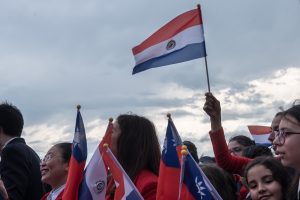On January 9, Taiwanese President Tsai Ing-wen welcomed a congressional delegation from the Republic of Paraguay to the presidential office in Taipei. Her objective was simple: to remind the visiting politicians of her country’s value as an ally.
Tsai welcomed this delegation amid an uncertain time in bilateral ties. Among the 13 sovereign countries – 14, if you include the Vatican – that continue to maintain relations with Taiwan, Paraguay is the by far largest, and the only nation in South America. Diplomatic ties between the two countries were established in 1957 by the autocratic and anti-communist governments of Taiwanese President Chiang Kai-shek and Paraguayan President Alfredo Stroessner, and has persisted beyond the end of the Cold War and both countries’ simultaneous democratization.
However, that relationship is now under threat. Efrain Alegre, chief presidential candidate of the opposition and leader of the Authentic Radical Liberal Party (PLRA), has stated that a victory by his coalition in Paraguay’s April 30 general election would lead to the country establishing relations with China. The declaration from the two-time presidential runner-up is widely expected to be popular with the country’s influential beef and soy industries, which have long sought to remove barriers to exporting their products to China.
Beijing refuses relations with any country that formally recognizes Taiwan, so Paraguay has virtually no access to the world’s second-largest economy, with predictable results. A recent estimate demonstrated that Paraguay lost out on the equivalent of 1 percent of its gross domestic product annually during the commodities boom that powered South America early this century. While indirect trade has persisted through Argentine and Uruguayan ports, the movement to switch ties from Taipei to Beijing has gained momentum alongside China’s explosive economic rise and considerable loans to the region.
Many Latin American countries that have recently switched recognition – such as Panama and the Dominican Republic – have seen a subsequent influx of Chinese investments and other capital. Paraguay would no doubt see similar results, particularly given the deepening economic ties between its Mercosur partners – Argentina, Brazil, and Uruguay – and China. This economic appeal helps to explain the multiple congressional votes along party lines urging the opening of relations with China.
Tsai is aware of all these realities, which explains in large part how she has approached relations with her country’s largest formal ally. One of her very first state visits as president was to Paraguay, where she attended a 2016 state banquet hosted by then-President Horacio Cartes in her honor. She returned the favor a year later, hosting Cartes and other Paraguayan leaders in Taiwan, and has continued a trend of high-level visits which includes last Monday’s meeting.
Meanwhile, there are Taiwan-donated monuments commemorating decades of friendship at a stone’s throw from the Paraguayan seat of government in the Palacio de López, while statues of Chiang Kai-shek can be seen on avenues in Asunción bearing his name. Facilities displaying the Taiwanese flag even appear sporadically along Paraguay’s major Route 2, which connects the capital with the commercial city of Ciudad del Este.
While it cannot keep up with China’s economy, Taipei has been active in demonstrating that it prioritizes Paraguay’s government in a way that few other states do, as part of what has been called a mutual “exchange of international status.”
The pandemic has also carried steep implications for the countries’ relations. In March 2021, as Paraguay dealt with a surge in COVID-19 cases, the foreign ministry released a statement rejecting a proposed offer of Chinese vaccines in return for breaking off ties with Taiwan. Taipei was quick to respond, urging democratic allies such as India and Japan to step up their provision of vaccines to the country in order to counter China’s so-called “vaccine diplomacy.” Accounts later differed as to whether Taiwan played a role in India’s supplying of hundreds of thousands of doses to Paraguay.
The democratic focus in Taiwan’s messaging has also been consistent. During last Monday’s meeting, Tsai stressed the need for a democratic alliance “in the face of the continued expansion of authoritarianism.” Her comments were perhaps above all addressed to President of the Chamber of Deputies Carlos María Lopez Lopez, who led the delegation and who comes from the same party as Alegre – who, owing to divisions within Paraguay’s ruling Colorado Party, may just yet pull off a victory in April.
Taiwan’s relationship with Paraguay has often been safeguarded by the dominance of the Colorado Party, which has ruled the country for all but five of the last 77 years. The party’s presidential candidate for April, Santiago Peña, supports continued ties with Taiwan, in stark contrast to Alegre, but is not guaranteed a surefire victory as in past decades. Notably, the last man to defeat the Colorado Party and become president also vowed to open relations with China. (He was later removed from office on an unrelated matter).
Last July, President Mario Abdo Benitez defended the relationship with Taipei and urged caution as Mercosur partners weighed a free-trade agreement with China, demonstrating continued support for Taiwan within the Colorado Party. However, with los colorados once more at risk of losing the presidency, Taiwan risks losing its last remaining ally in South America.
It wouldn’t be the first such setback for Taipei. Since Tsai assumed office in 2016, Beijing has pried away eight of Taiwan’s former diplomatic allies, including four states in Latin America and the Caribbean region.
A little-known fact is that Paraguay is the exact opposite point – or antipode – on Earth from Taiwan, meaning every other location on the planet is technically closer. At last Monday’s meeting, Lopez mentioned this distance, warmly noting its contrast with “the affection and appreciation” the two countries shared.
Come April, his party will contest an election that could well change that relationship – in the process costing Taiwan one more valuable chip in its struggle for recognition.

































